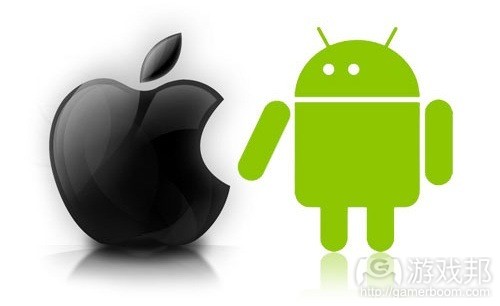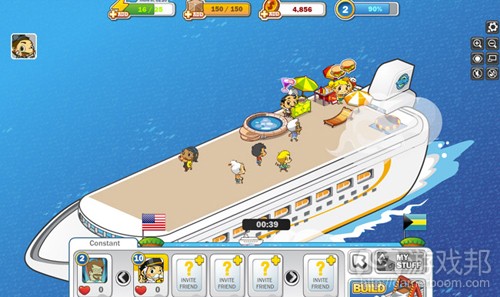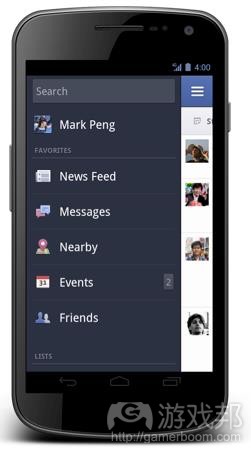每日观察:关注Donald Mustard对游戏故事元素的看法(12.12)
1)澳大利亚广告网络LeadBolt首席执行官Dale Carr最近撰文指出,Piper Jaffray数据显示Android开发者收益仅占iOS开发者的7%的说法缺乏根据。
他称这组数据并不包括Android开发者的广告收益,并以Inneractive的调查数据为例,指出iOS平台的广告CTR比Android平台多两倍以上,但其eCPM只比后者多30%,由此可见,Android开发者的每次点击收益其实更高。而最近也有其他调查数据显示,Andorid广告印象比iOS多两倍,Andorid的广告收益其实更为可观。
另外,从苹果相对保守的生态圈来看,App Store并不希望开发者从其他渠道获得收益,而Android具有开源、开放环境和开放市场的特点,再加上谷歌本身就是一个巨大的广告公司,当然会鼓励开发者多采用广告服务,以便从中实现更多收益。
2)据serkantoto报道,东京社交游戏开发商Klab最近因版权问题而起诉竞争对手Crooz(游戏邦注:这两者都是上市公司,Klab于今年9月才刚进行IPO)。
Klab声称Crooz游戏《Team x Kousou – Gang King》(于今年9月发布于Mobage平台)剽窃了《Sengoku Buster》(于今年3月发布于Mobage平台)中的大量元素,要求Crooz赔偿5500万日元(约合71万美元)的损失费。
Konami在今年9月也因类似问题起诉了社交游戏开发商gloop,观察者称法律诉讼现象在日本极为罕见,但随着社交游戏在该国的升温,预计该行业未来还会出现更多诉讼行为。
3)韩国网游公司Nexon最新Facebook游戏《Wonder Cruise》已进入公开测试阶段,据AppData数据显示,该游戏目前MAU为8000,DAU为2000。
与完美世界的《Perfect Getaway》一样,玩家在该游戏中的任务也是管理一艘豪华游轮,为乘客提供各种娱乐设施。如果游轮缺乏供应物品,玩家可使用Facebook Credits购买能量、物品等进行补充。
游戏的社交功能包括向涂鸦墙发布求助消息,赠送/接收礼物,添加并邀请好友访问游轮等。
4)Chair Entertainment创意总监Donald Mustard在最近媒体采访中表示,他认为游戏玩法与故事元素的结合,将成为游戏媒介发展的最高境界。
他称日本游戏设计理念常对西方游戏设计带来重大影响,他目前最喜欢Naughty Dog《神秘海域》系列中的故事情节。该系列游戏中的角色对话,角色之间的关系,以及角色的招牌式动作等一系列精细的内容,让他更加关注游戏玩法。
他希望自己的团队也能做出更多此类好游戏,但这种精致的内容往往极为耗时耗体,《无尽之剑》系列的细节虽然无需达到这种水准,但其游戏实际上也是架构于坚实的故事基础之上,甚至还邀请《时光之轮》作者Brandon Sanderson为游戏撰写了故事脚本。
5)Facebook近日宣布将推出更新版本的Android应用,其运行速度比原版Android应用快两倍。
新版Android应用与iPad版本极为相似,其菜单现在设置于应用的左侧,以便用户在查看新闻、消息和其他功能时,无需往返切换至主界面。
该版应用将于不久登陆Android Market,据称传闻中采用Android操作系统的Facebook手机将于未来12-18个月内面世。(本文为游戏邦/gamerboom.com编译,拒绝任何不保留版权的转载,如需转载请联系:游戏邦)
1)Apple iOS vs. Android developers: Who’s making more money?
Dale Carr
Dale Carr is CEO of Los Angeles and Sydney, Australia-based ad network LeadBolt.
Android developers are getting just 7% of the revenue that Apple iOS developers are getting, according to a recent article that quoted research by Piper Jaffray. The article’s premise was that developers will obviously go where the money is, so Android will continue to struggle when it comes to drawing in more developers. This got me really thinking … could this be right?
If it is, who are all the developers on my company’s ad network?
It really is amazing what you can do with statistics.
First, the 7% statistic relates to revenue earned from the sale of apps, so it doesn’t include ad revenue. Second, it uses revenue numbers from the life of Apple’s App Store, which has obviously been around a lot longer and is much further up the growth hockey stick than Android.
Some more stats to confuse the issue:
According to research by Inneractive, click-through-rates (CTR) on iOS are more than double what they are on Android, but the cost-per-thousand (eCPM) is only 30% higher. This would indicate that Android developers are getting more bang for each click. Combine this with another recent statistic that Android generates twice the ad impressions of iOS and you have Android earning more in real dollar terms from ad revenue.
So, perhaps a more considered approach is required in comparing the revenues developers make off the two platforms.
Apple has built a closed ecosystem. It heavily regulates the App Atore and does not look favourably on revenue generated outside of this environment. Ad revenue is the major hole in its “atmosphere”. It cannot, for obvious reasons, close the hole. It has tried to be part of the leakage through iAds. Given its current mindset, it is in Apple’s interest to control this outflow from its incredibly full bucket.
On the other side you have Android. Open source, open environment, open market. Added to the mix is that Google, the developer of the Android platform, is an advertising company. Wouldn’t it be in Google’s interest to ensure the ad revenue floodgates open as wide as possible?(source:venturebeat)
2)Social Gaming Company Klab Sues Competitor Crooz [Social Games]
by Dr. Serkan Toto
In Japan First the GREE-DeNA lawsuit, now this: Tokyo-based social game maker Klab has sued competitor Crooz for copyright infringement. Both companies are listed (Klab just went IPO in September).
Klab is asking for 55 million yen (US$710,000) in damages. The company claims that Crooz infringed on the copyright of a game called Sengoku Buster, which was released on Mobage in March this year.
Klab says that Crooz copied a lot of elements from that title for “Team x Kousou – Gang King”, a social game also released on Mobage in September.
Konami has filed a similar lawsuit against social game provider gloops in September this year.
Lawsuits are famously rare in Japan, but with the social gaming market in this country heating up, I am expecting even more legal action in the industry in the future.(source:serkantoto)
3)Nexon Christens Wonder Cruise on Facebook
Randy Nelson
Wonder Cruise is the latest social gaming offering from Nexon on Facebook. The title is currently in open beta, having gone live in “pre-beta” form in August of this year.
According to our traffic tracking service AppData, Wonder Cruise currently has 8,000 monthly active users and 2,000 daily active users.
Similar to Perfect World’s ailing Perfect Getaway, Wonder Cruise, players are in charge of operating a luxury cruise ship and tending to the needs of their passengers. They do this by stocking up on supplies, building attractions, and directing their passengers to them. These, in turn, pay out coins, the game’s soft currency. Supplies for the attractions become depleted and must be re-stocked. If players run out of supplies, more can be purchased. They’re also able to take their ships to new ports of call, and earn coins and experience for doing so.
The deck of the cruise ship serves as the building platform for various attractions, including food vendors, swimming pools, basketball courts, and games of chance. There are also “Wonders,” fanciful attractions such as butterfly gardens and animal habitats that can be won during gameplay or purchased using Facebook Credits. The more elaborate the attraction, the more it costs, but also the more it pays out in terms of coins. Players are also able to buy new deco items to enhance the appearance of their ships.
Helping out passengers with their needs rewards players with experience points. As they gain more, they level up and have access to more attractions and decoration items. Actions require energy, which replenishes over time or can be purchased. In addition to pointing them towards attractions, players can help their passengers in need of socializing and partying, and will see when they have passengers who’re looking to find a type of attraction they don’t yet have on their ship.
Wonder Cruise includes a standard set of social features, such as posting of accomplishments on their Walls, asking for help on the friends’ Walls, sending/receiving gifts, and adding friends in the game in order to visit their ships for bonuses.
Nexon is monetizing Wonder Cruise by offering energy, supplies, and coins in exchange for Facebook Credits. Players can also spend Credits on premium attractions, decoration items, and Wonders.
Given the game’s similarities to Perfect Getaway and Ravenwood Fair, it’ll be interesting to see if Nexon makes use of any branding or art design to make Wonder Cruise unique. So far, the South Korean MMO developer has developed or co-developed three games for Facebook and invested in two established social game developers.(source:insidesocialgames)
4)’The Next Horizon Of Games’ According To Infinity Blade II’s Donald Mustard
by Christian Nutt
Chair Entertainment’s Donald Mustard is looking forward to the fusion of gameplay and story that will be the apex of the gaming medium. In his view we’re not there yet — not even close.
Mustard has spoken to Gamasutra about how he feels that Japanese game design is often “stomping” Western game design, but he also feels that “when it comes together, it will be some Western studio doing it.”
His current favorite example of storytelling in games is Naughty Dog’s Uncharted series. Uncharted 3 is one of the two games he’s playing this fall, alongside The Legend of Zelda: Skyward Sword.
“I play Uncharted and I’m just blown away by the little stuff,” says Mustard. “That attention to detail and character development is awesome in a video game. I mean, it’s stuff that we take for granted in film, because we see it all the time.”
What kind of stuff is that? “Sophisticated character development that makes me care so much more about the gameplay,” like conversations that show the relationships between characters, or shots of characters acting autonomously during scenes in character-consistent ways.
“That’s hugely awesome, and I desperately want to do stuff like that more in our games,” says Mustard. But the problem is that “that’s way hard to do, and a ton of work… it’s almost demoralizing.”
“I want to combine that with some of the just really amazing kind of core gameplay stuff that they’re doing in Zelda. I think that if you could marry that together better, that sense of difficulty and progression from the gameplay standpoint, with the narrative, then we’ll get there. And that, to me — that’s the next horizon of games.”
Though you might not think the Infinity Blade series requires that level of detail, Mustard says that the game is actually based on a solid foundation of story and even has a story bible written by Brandon Sanderson, author of the recent Wheel of Time books, and based on the studio’s own world-building.
This complex story is “what I’ve always hoped would happen, because at the end of the day, that’s what I want. I want to tell really cool stories, in really cool universes, through really cool compelling gameplay,” says Mustard.
“It didn’t really work out on Advent Rising; we hadn’t got there yet on Shadow Complex, but Infinity Blade is blowing up, and so what I’d always hoped and expected would happen has now happened. And so now it’s just luckily we know what’s going on.”(source:gamasutra)
5)Facebook’s Updated Android App Looks a Lot Like its iPad App
By Alicia Eler
Today Facebook announced that it is launching an update to its Android app that it is “two times faster than previous Android apps.” This update looks a lot like the Facebook iPad app, all the way down to the Nearby option, which was previously called Places and, previous to that, Check-In. Messages and notifications start at the top of the screen, which should make navigation around the app much simpler. The menu is now located on the left-hand side of the app. Users don’t have to switch back-and-forth from the Home screen just to see events, news feed and messages and other features. Now everything is located in one space.
Slowly but surely, the world’s biggest social network is beginning to converge its platform UIs. The big question is, will users like the new UI?
A word from our sponsor:
GageIn is a business content hub for professionals. Our content, curated from 2 million company websites, 19 thousand publications, and social media platforms, enables users to discover and share the most relevant updates with their network. Sign up for a free account today!Ad powered by BTBuckets
Historically, Facebook has been slow to update its Android apps. When it finally does, it packs in a lot.
Zuckerberg has gone on the record as admitting that Facebook’s Android apps have always “been a little behind.” The update will be available for download soon in the Android Market. With the shift toward HTML5 and the convergence of platform UIs, this seems likely to change.
Speaking of Android, the long-rumored Facebook phone will run a modified version of Android. It is slated to launch sometime in the next 12-18 months.(source:readwriteweb)











































 闽公网安备35020302001549号
闽公网安备35020302001549号